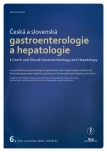Fertility, pregnancy, breastfeeding and chronic inflammatory bowel diseases – Consensus of the ECCO 2010
Authors:
M. Bátovský
Authors‘ workplace:
Gastroenterologická klinika FNsP a SZU
Published in:
Gastroent Hepatol 2010; 64(6): 26-30
Category:
IBD
Overview
Irritable bowel diseases do not seem to affect fertility when the disease is inactive. It is advisable to strive for clinical remission before conception. Crohn’s disease carries the risk of preterm delivery and low birth weight. If conception occurs at a time of quiescent disease, the risk of relapse is the same as in non-pregnant women. If conception occurs at a time of active disease, two-thirds of patients have persistent activity and of these, two-thirds deteriorate during pregnancy. Medical treatment for Crohn’s disease (except for methotrexate) can generally continue during pregnancy, because the benefits outweigh the risk of medication. Since metronidazole and ciprofloxacin are excreted into milk, they are usually not considered appropriate during the breastfeeding period.
Key words:
fertility – pregnancy – breastfeeding – chronic inflammatory bowel diseases – Crohn’s disease – therapy
Sources
1. Siegmund B, Zeitz M. Chronisch enzundliche Darmerkrankungen und Schwangerschaft. Z Gastroenterol 2009; 47 : 1069–1074.
2. Mahadevan U. Fertility and pregnancy in the patient with inflammatory bowel disease. Gut 2006; 55(8): 1198–1206.
3. Feagins L, Kane SV. Sexual and reproductive issues for men with inflammatory bowel disease. Am J Gastroenterol 2009; 104(3): 768–773.
4. Moody GA, Probert C, Jayjanthi V. The effects of chronic ill health and treatment with sulphasalasine on fertility amongs men and women with inflammatory bowel disease in Leicestershire. Int J Colorect Dis 1997; 12(4): 220–224.
5. O´Donnel S, O´Morain C. Review article: Use of antitumour necrosis factor therapy in inflammmatory bowel disease during pregnancy and conception. Aliment Pharmacol Ther 2008; 27(10): 885–894.
6. Mahadevan U, Terdiman JP, Anon J. Infliximab and semen quality in men with inflammatory bowel disease. Inflamm Bowel Dis 2005; 11(4): 395–399.
7. Van Assche G, Diggens A, Reinisch W. The second European evidence-based consensus on the diagnosis and management of Crohn´s disease: special situations. J Crohn´s and Colitis, 2010, doi:10.1016/j. crohns. 2009.9
8. Zelinkova Z, Meusink PBF, Dees J. Reproductive wish represents an important factor influencing therapuetic strategy in inflammmatory bowel diseases. Scand J Gastroenterol 2010; 45(1): 46–50.
9. Alstead EM, Ritchie JK, Lennard-Jones JE. Safety of azathioprine in pregnancy in inflammatory bowel disease. Gastroenterology 1990; 99(2): 443–446.
10. Francella A, Dyan A, Bodian C. The safety of 6-mercaptopurine for childbearing patients with inflammatory bowel disease. Gastroenterology 2005; 128 (Suppl): A12.
11. Bretschinger P, Himmelmann A, Risti B. Cyclosporine treatment of severe ulcerative colitis during pregnancy. Am J Gastroenterol 1995; 90(2): 330.
12. Nerome Y, Imaraka H, Nonak Y. A case of planed pregnancy with with an interruption in infliximab administration in a 27-year-old female patient with rheumatoid –factor-positive polyarthritis juvenile idopatic arthritis which improved after restarting infliximab and methotrexate. Mod Rheumatol 2008; 18(2): 189–192.
13. Katz JA, Antoni C, Keenan GF. Outcome of pregnancy in women receiving infliximab for the treatment of Crohn´s disease and rheumatoid arthritis. Am J Gastroenterol 2004; 99(12): 2385–2392.
14. Coburn LA, Wise PE, Schwatz DA. The successful use of adalimumab to treat active Crohn´s disease of an ileoanal pouch during pregnancy. Dig Dis Sci 2006; 51 : 2045–2047.
15. Ostensen M. Are TNF inhibitors safe in pregnancy? Nature 2009; 5 : 184–185.
16. Carter JD, Ladhani A, Ricca LR. A safety assessment of tumor necrosis factor antagonists during pregnancy: a review of the Food and Drug Administration database. J Rheumatol 2009; 36(3): 635–641.
Labels
Paediatric gastroenterology Gastroenterology and hepatology SurgeryArticle was published in
Gastroenterology and Hepatology

2010 Issue 6
- Possibilities of Using Metamizole in the Treatment of Acute Primary Headaches
- Metamizole at a Glance and in Practice – Effective Non-Opioid Analgesic for All Ages
- Metamizole vs. Tramadol in Postoperative Analgesia
- Spasmolytic Effect of Metamizole
- The Importance of Limosilactobacillus reuteri in Administration to Diabetics with Gingivitis
-
All articles in this issue
- The place and detection rates of colonoscopy within a faecal occult blood test-based screening program
- Extraesophageal reflux up-to-date
- Non-steroidal anti-inflammatory drugs induced colopathy, mimicking Crohn’s disease
-
Klíčové otázky a odpovědi v léčbě Crohnovy nemoci
Závěry mezinárodního projektu IBD-AHEAD
- Fertility, pregnancy, breastfeeding and chronic inflammatory bowel diseases – Consensus of the ECCO 2010
- Biodegradable stents in benign stenosis of the biliary tract
- Reflection of UEGW 2010
- Gastroenterology and Hepatology
- Journal archive
- Current issue
- About the journal
Most read in this issue
- Extraesophageal reflux up-to-date
- Biodegradable stents in benign stenosis of the biliary tract
- Non-steroidal anti-inflammatory drugs induced colopathy, mimicking Crohn’s disease
- Fertility, pregnancy, breastfeeding and chronic inflammatory bowel diseases – Consensus of the ECCO 2010
